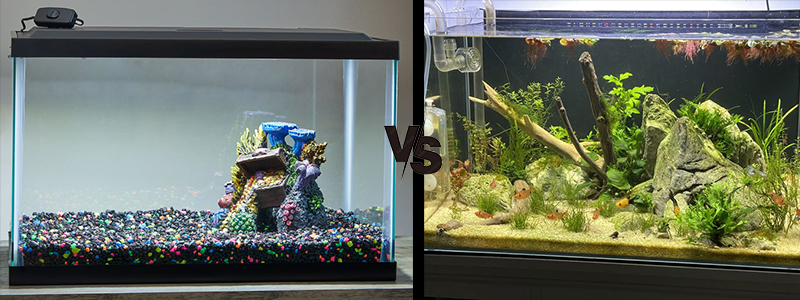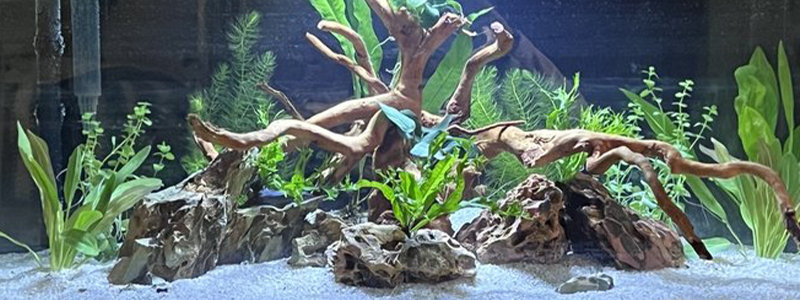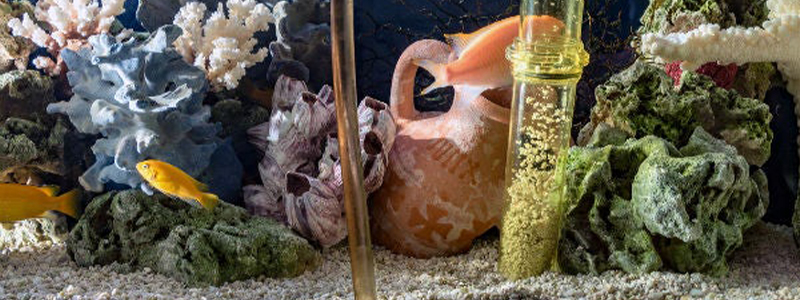The question, of how to use aquarium salt has been a topic of debate: to use it or not, and if so, then how? However, the truth lies somewhere in between these conflicting opinions.
Freshwater fish owners need to understand the significance of aquarium salt for ich and what does aquarium salt do to contribute to their fish’s health and overall well-being.
Unfortunately, many fish owners lack awareness about the proper application method of how to use aquarium salt. Therefore, get ready to expand your knowledge, if you want to be pro at providing better care to your beloved fishes!
Disclosure: This article contains affiliate links. When you follow a link to purchase the products, I sometimes earn a commission, at no additional cost to you. Read my full disclosure here.
What does Aquarium Salt do?
The first and foremost question is what does aquarium salt do? Aquarium salt is like an all-in-one thing for aquarium hobbyists!
A lot of people who are passionate about keeping fish have realized that adding a small quantity of aquarium salt to their freshwater tanks can be advantageous for their fish.
So, if you are wondering what does aquarium salt do, then consider it a convenient remedy! It is commonly used for dealing with common problems that fish face, plus it also acts as a preventive measure against many infections.
Here are the top 4 answers to what does aquarium salt do;
Improving Fish Health and Welfare
Aquarium salt offers multiple benefits when it comes to the well-being of your fish. It helps improve the function of their gills, allowing them to breathe more efficiently.
Additionally, aquarium salt provides essential electrolytes that help reduce stress levels in your aquatic pets and promote their overall health.
Osmoregulation- Maintaining Salts Concentration
Maintaining the right balance of salts in a freshwater aquarium is important for osmoregulation.
Freshwater fish naturally have more salt than the water they live in, which means that they are constantly taking in and releasing salts through their skin and urination. This delicate equilibrium can be disrupted if there isn’t enough salt present.
Thus, here comes the answer to what does aquarium salt do. By adding aquarium salt to your tank, you help restore this balance by allowing fish to absorb essential salts from their environment.
Managing Nitrates
Another important aspect of what does aquarium salt do is – managing nitrates!
A healthy balance of water chemistry and managing nitrate levels is crucial in keeping your aquarium thriving.
One effective tool to achieve this is by using aquarium salt, which can have a significant impact on both areas. Nitrates, which are often produced from fish waste, can become problematic if not properly controlled. For example, instances like setting up a new tank or experiencing filter malfunctions may lead to an increase in nitrate levels that could potentially harm your fish.
The introduction of aquarium salt creates a natural barrier that helps prevent excessive absorption of nitrates by the fish. (Note that this is just a temporary solution)
Treating Fungal and Parasitic Infections
Treating Fungal and Parasitic Infections Aquarium salt offers additional benefits that may not be widely known.
By using a salt bath, you can quickly and effectively eliminate parasites that affect fish. So, in case you are thinking what does aquarium salt do in treating infections, it disrupts the internal salt-water balance of these harmful organisms, ultimately dehydrating them and making them inactive.
Moreover, salt baths promote the production of a protective slime coat on fish, strengthening their defenses against diseases.
How to Use Aquarium Salt?
So, now that you are aware of what does aquarium salt do, it’s time for us to make you familiarize with the correct method of how to use aquarium salt. Have a look!
Parasite Management: Performing Dip
- A clean bucket should contain four tablespoons of aquarium salt.
- Pour a single gallon of tank water gradually while swirling it to dissolve the salt.
- Watch for distress while submerging the fish for 10 to 30 minutes.
- Return stressed fish to the tank.
- Infections, slime coat problems, and wounds are all avoided with salt dip.
- Following the treatment of how to use aquarium salt, add fresh water to remove the salt.
Stress and Nitrate Prevention: Performing a Bath
- In each gallon of tank water, dissolve one teaspoon of salt.
- Fill the tank with the solution.
- Dissolve four teaspoons per gallon.
- Begin 28% weekly water changes after the first bath.
- Don’t increase the salt in your bath.
- Once, you learn how to use aquarium salt correctly, you can reduce fish stress and avoid nitrite poisoning easily!
Quantity of Aquarium Salt for Ich to be Used
- Treatment Level 1: Gentle Care
Add 1 tablespoon of aquarium salt for ich for every 3 gallons of water. The salt can be added directly to the aquarium or it can first be dissolved in a tiny bowl of water.
This level of care is comparable to applying a light ointment to a minor cut. It works perfectly for minor infections or wounds.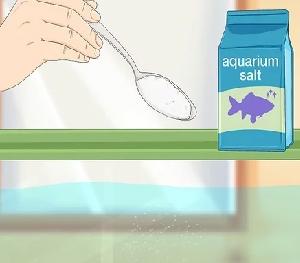
- Treatment Level 2: Stepping Up
To take your treatment to the next level, simply increase the amount of aquarium salt for ich you use. Instead of 1 tablespoon for every 2 gallons of water, try using a stronger solution this time.
For example, if your fish is suffering from ich (white spot disease), this increased treatment can help alleviate symptoms for up to 10 days.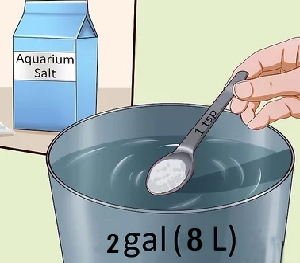
- Treatment Level 3: Strong Defense
Combine 1 tablespoon of aquarium salt for ich per gallon of water to create a potent solution that can effectively address various issues.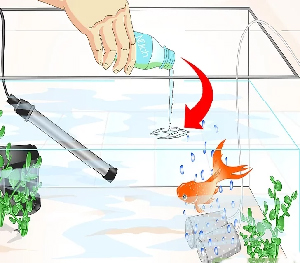
Can Too Much Aquarium Salt Kill Fish?
Using aquarium salt correctly can be beneficial for fish, but the question arises, can too much aquarium salt kill fish?
It’s worth noting that different species of fish have varying levels of tolerance when it comes to the presence of salt in their water environment. For instance, certain types of fish such as catfish and discus which require soft and acidic water might not respond well to the addition of salt.
On the other hand, goldfish, guppies, and many African cichlids generally tend to tolerate it without any major issues. Also, note that unlike medications or chemicals used in an aquarium setup, salt doesn’t evaporate or get filtered out naturally over time.
Therefore, if you are concerned that can too much aquarium salt kill fish, so the answer is yes! Make sure you do it cautiously with measurements as overdosing can lead to harmful effects.
Can I Use Aquarium Salt for Ich?
White spot disease, also known as ich, is a common problem faced by tropical aquarium fish. It is characterized by the presence of distinct white spots around the gills.
Thankfully, there is a simple solution available in the form of aquarium salt for ich. Increasing the concentration of salt in the tank triggers osmoregulation in the fish and disrupts parasites, bacteria, and fungi that cause ich.
This method is highly effective for managing and treating this disease, making aquarium salt for ich an amazing treatment option.
Can I Use Sea Salt Instead of Aquarium Salt?
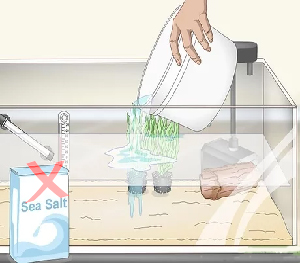 Out of all the queries about aquarium salt, the one most repeated is Can I use sea salt instead of aquarium salt?
Out of all the queries about aquarium salt, the one most repeated is Can I use sea salt instead of aquarium salt?
Aquarium salt should never be confused with sea salt! Unlike aquarium salt, sea salt contains chemical buffers that can be harmful to freshwater fish. Its main purpose is only to target marine tanks to help solely for creating a saline water environment.
Marine aquarists commonly use sea salt mixed with tap water and a conditioner to achieve the appropriate water conditions required for their tanks. It’s worth noting that sea salt should never be used as a remedy or solution in freshwater tanks.
In contrast, unlike common table salts which have additives and may pose harm when used in freshwater environments; aquarium salts are specifically designed for the well-being of freshwater fish.
So, if you hear any aquarium hobbyist asking, can I use sea salt instead of aquarium salt? Let them know that it’s not the right option!
What is the Substitute for Aquarium Salt?
- Rock Salt
Also known as halite, rock salt is a natural and unrefined form of salt that is commonly used for de-icing roads. It can also be used as a substitute for aquarium salt because it doesn’t contain any additives or impurities. Before using rock salt in your tank, make sure it doesn’t have any additional substances.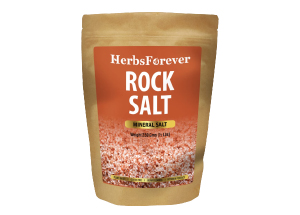 Quick view on Amazon
Quick view on Amazon
Available in: Australia, Canada, UK and US - Kosher Salt
This type of salt is often utilized in cooking and does not include anti-caking agents found in table salt. It’s a safer option for your aquarium; however, keep in mind that kosher salt as a substitute for aquarium salt lacks the same electrolytes present in Aquarium salt.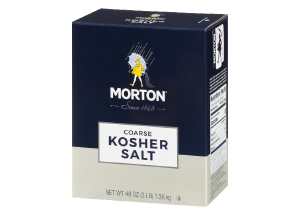 Quick view on Amazon
Quick view on Amazon
Available in: Australia, Canada, UK and US - Epsom Salt
Consisting of magnesium and sulfate compounds, Epsom salts are another potential substitute for Aquarium salt use. It has proven effective when treating constipation and specific ailments experienced by fish species.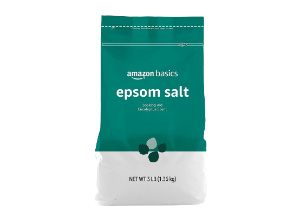 Quick view on Amazon
Quick view on Amazon
Available in: Australia, Canada, UK and US
When to Avoid Aquarium Salt?
You have to avoid aquariums salt when you have;
- Live Plants: If you have live plants, it is better to avoid aquarium salt for live plants’ well-being! Even a a very little quantity of salt can cause damage to these plants.
- Scaleless Fish: Fish without scales like corydoras and tetras are especially susceptible to the effects of excess salt. A teaspoon per gallon is enough for their treatment.
Wrap Up
As we have taken you through the whole aquarium salt guide, it’s clear that aquarium salt has an important role to play in maintaining the health of fish.
When used correctly, for example through dips and baths, it can effectively prevent parasites, improve stress resistance, and promote overall wellness.

